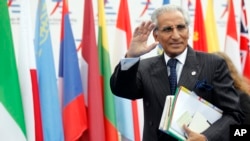Pakistan’s prime minister, Nawaz Sharif, fired a key foreign policy aide Saturday, along with a senior information ministry bureaucrat, for their alleged roles in leaking details to the media on a top-level security meeting about counter-militancy efforts.
An official announcement said Sharif ordered that the portfolio of foreign affairs shall be withdrawn “forthwith” from his special assistant Tariq Fatemi, and for the principal information officer, Rao Tehsin, to be removed from his post.
The actions stemmed from a controversial article in a leading English-language newspaper, Dawn, published last October, that suggested the Sharif government was not satisfied with military-led operations against militant groups allegedly operating on Pakistani soil, particularly those involved in attacks against neighboring Afghanistan and India.
The newspaper article was published at a time when Afghan and Indian officials were increasingly demanding Pakistan’s international isolation, citing alleged covert support the military was providing to militants undertaking cross-border attacks.
The military at the time dismissed the report as fabricated, however, demanded a government probe and punishment of officials for “breaching national security.”
Saturday’s removals were based on a lengthy inquiry by a high-powered committee of civilian and military officials that apparently was set up at the insistence of the army leadership at the time.
Sharif’s office said he notified the officials after considering findings and recommendations in the inquiry report. The official notification also called for relevant Pakistani media watchdogs to take “disciplinary action” against the reporter and the editor of the newspaper in question.
Dawn has stood by its story and rejected official allegations of fabricating details of the security meeting.
Hours after the prime minister’s office issued the notification, though, the military rejected it as “incomplete.”
“Notification on Dawn Leak is incomplete and not in line with recommendations by the inquiry Board. Notification is rejected,” said army spokesman, Major-General Asif Ghafoor via his official Twitter post.
The strong reaction led to a heated debate and speculation on local TV stations that civilian and military institutions were again on a path of confrontation, which in the past led to military takeovers in Pakistan. Most analysts played down the concerns and said they anticipated conciliation over the issue.
Speculation intensified, however, when Sharif’s interior minister, Nisar Ali Khan, snubbed the army reaction as uncalled for.
“I believe these tweets, regardless of who issues them, are deadly for Pakistan’s democracy, its system and justice. [State] institutions do not talk to each other via tweets,” the minister asserted. He went on to call it “very unfortunate” that national issues are being “handled via tweets” and reiterated the government was fully implementing recommendations of the probe committee.
The military spokesman has not yet responded to Khan’s assertions. Critics also questioned the army's reaction.
“Shouldn't we amend Article 243(1) of the Constitution of Pakistan [that says]: “The federal government shall have control and command of the Armed Forces”, said a Supreme Court attorney in his Twitter post.
Tensions between civilian and military leaders have prompted army leaders in the past to oust elected governments and impose years of military rule in Pakistan.
Former army chief, Pervez Musharraf, removed Sharif from power in a bloodless coup in October 1999 and exiled him to Saudi Arabia.
Sharif returned to Pakistan after almost eight years, and his party won the 2013 election to return him to power for a third time in the country's troubled democratic history.




